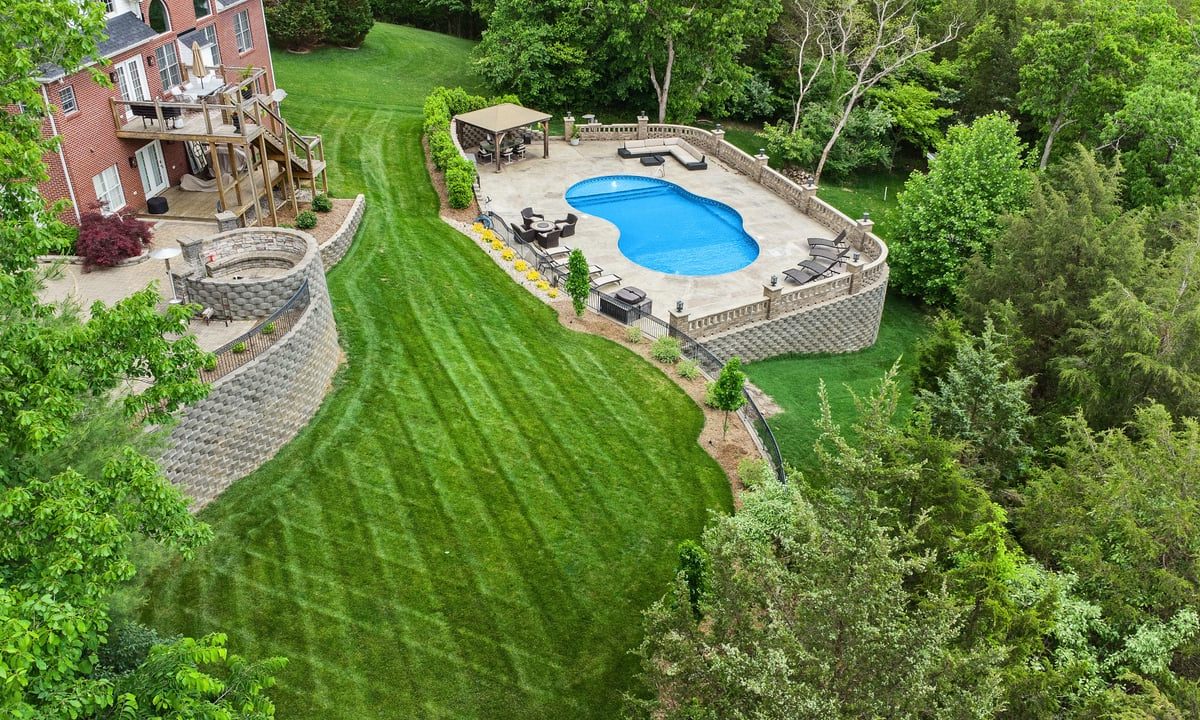
Expert Tips from Steele Blades | Residential & Commercial Lawn Care
Summers in Louisville, Kentucky can be intense—high humidity, blazing sun, and weeks without rain can take a toll on even the most well-maintained landscapes. Whether you’re a homeowner trying to keep your grass green or a commercial property manager aiming for professional curb appeal, it’s important to adapt your lawn and landscape care strategy for the summer heat.
At Steele Blades, we specialize in year-round lawn care that meets the unique needs of our climate. Here’s our guide to keeping your lawn and landscape healthy, vibrant, and stress-free—even during Louisville’s hottest months.
1. Water Early, Deeply, and Less Often
In summer, your lawn doesn’t need more frequent watering—it needs smarter watering. The best approach is to water deeply and infrequently to encourage strong, deep root systems. Shallow, daily watering actually makes your grass more vulnerable to heat stress and drought.
Tips for effective watering:
- Water early in the morning (before 9 a.m.) to reduce evaporation.
- Aim for about 1 to 1.5 inches of water per week, including rainfall.
- Use a rain gauge or tuna can to measure irrigation levels.
- Focus on the root zone—avoid overwatering sidewalks or driveways.
Automated irrigation systems with zone controls can help ensure your landscape is getting exactly what it needs. Steele Blades can help you set up or fine-tune your watering schedule based on your lawn’s specific needs.
2. Adjust Your Mowing Height
During the summer, raising your mower blade is one of the simplest and most effective things you can do. Taller grass shades the soil, helps retain moisture, and protects roots from the scorching sun.
Best mowing practices for summer:
- Set mower height to 3 to 4 inches for cool-season grasses.
- Never cut more than 1/3 of the grass blade at once.
- Keep mower blades sharp to avoid tearing grass.
- Leave clippings on the lawn to retain moisture and nutrients.
Consistent mowing at the right height helps keep your lawn thick and prevents weed growth without adding stress to your turf.
3. Hold Off on Fertilizing
Fertilizer can help your lawn grow—but in the peak of summer, it can do more harm than good. Applying fertilizer during hot, dry periods can burn your lawn and stimulate growth at the wrong time, causing stress to an already struggling turf.
Instead, we recommend:
- Pausing fertilization until cooler weather returns in early fall.
- Using organic or slow-release formulas if summer feeding is essential.
- Applying compost or humic acid to improve soil health without overstimulating growth.
Need help planning your fertilization schedule? Check out our full Lawn Care Services for year-round guidance.
4. Mulch for Moisture Retention
Mulching is one of the best ways to protect your landscape beds and ornamental plants from summer heat. A proper layer of mulch acts like a natural insulator, keeping soil cool and moist while reducing the need for constant watering.
Tips for effective mulching:
- Apply 2–3 inches of natural mulch around trees, shrubs, and flower beds.
- Keep mulch a few inches away from plant stems and tree trunks.
- Replenish faded or thin areas from spring installations.
In addition to its functional benefits, mulch also improves curb appeal by giving your beds a clean, finished look.
5. Keep an Eye Out for Pests and Disease
Heat-stressed lawns and landscapes are more susceptible to pests and fungal diseases. Louisville summers can create the perfect environment for chinch bugs, grubs, armyworms, and brown patch disease to thrive.
Early detection is key:
- Look for thinning patches, unusual browning, or bite marks on leaves.
- Check for active insects under thatch or in soil near damaged areas.
- Avoid overwatering or watering at night, which can promote fungal growth.
If you suspect an infestation or disease issue, contact Steele Blades for a lawn health assessment and customized treatment plan.
6. Maintain Trees, Shrubs, and Plant Beds
Don’t forget that your landscape is more than just grass. Summer stress affects trees, shrubs, and annual plants too—especially in urban areas where reflected heat from pavement and buildings can amplify the effects.
Best practices include:
- Water deeply at the base of plants to support root zones.
- Prune dead or damaged branches to reduce strain.
- Use shade cloth or row covers to protect delicate plants, if needed.
A properly maintained plant bed can handle the heat more gracefully and bounce back quickly with the return of cooler temperatures.
7. Consider Seasonal Enhancements
If your lawn or landscape is struggling, summer is a great time to reassess and upgrade your design. Strategic plant selection, hardscaping features, and irrigation improvements can help reduce maintenance stress and improve overall performance.
Ideas for seasonal upgrades:
- Install drought-tolerant plants that thrive in Louisville’s summer heat.
- Replace underperforming turf areas with mulch, stone, or decorative groundcovers.
- Upgrade to drip irrigation systems for better efficiency in flower beds.
Our landscape experts at Steele Blades can help you choose enhancements that add both beauty and durability to your property.
Let Steele Blades Keep Your Landscape Cool and Thriving
Managing lawn and landscape care during a hot Louisville summer requires knowledge, timing, and the right tools. Whether you’re maintaining a small backyard or managing a large commercial property, Steele Blades has the experience to help your landscape survive—and even thrive—through the heat.
We offer:
- Residential and commercial lawn maintenance
- Irrigation system installation and scheduling support
- Mulch and seasonal bed care
- Pest and disease diagnosis and treatment
- Customized summer lawn health programs
Don’t let summer stress damage your investment. Contact Steele Blades today to schedule seasonal service, get a lawn care quote, or learn more about how we can keep your landscape cool and healthy—no matter how hot it gets.
